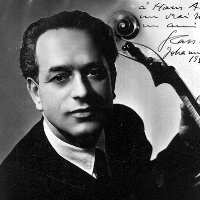In the pantheon of 20th-century classical music, few names shine as brightly yet remain as underappreciated as Gaspar Cassadó. Born on September 30, 1897, in Barcelona, Spain, Cassadó emerged as a prodigious talent on the cello, captivating audiences with his passionate performances and innovative compositions. His life story is a testament to the power of music to transcend borders and touch the human soul.
Cassadó’s musical journey began under the tutelage of his father, Joaquim Cassadó, a renowned organist and composer. The young Gaspar displayed an innate affinity for the cello, and his father nurtured this talent with unwavering dedication. At the tender age of nine, Cassadó’s exceptional abilities caught the attention of the legendary Pablo Casals, who would become his mentor and lifelong friend.
In 1910, at just thirteen years old, Cassadó moved to Paris to study with Casals, immersing himself in the vibrant cultural milieu of the French capital. This period proved transformative for the young cellist, exposing him to a diverse array of musical influences and fostering his growth as both a performer and composer. Cassadó’s time in Paris also brought him into contact with luminaries such as Maurice Ravel and Manuel de Falla, further enriching his musical palette.
As Cassadó matured, he developed a distinctive playing style characterized by a warm, rich tone and remarkable technical prowess. His interpretations of classical repertoire were infused with a uniquely Spanish flavor, drawing on his Catalan heritage and the folk music traditions of his homeland. This fusion of classical technique and regional flair set Cassadó apart from his contemporaries and endeared him to audiences worldwide.
Throughout his career, Cassadó maintained a rigorous performance schedule, gracing concert halls across Europe and the Americas with his captivating musicianship. His repertoire was vast and eclectic, encompassing works from the Baroque era to contemporary compositions. Cassadó’s interpretations of Bach’s Cello Suites, in particular, were hailed for their emotional depth and technical brilliance.
Beyond his prowess as a performer, Cassadó made significant contributions to the cello repertoire as a composer. His works, which include concertos, sonatas, and chamber pieces, reflect a unique blend of Spanish romanticism and modern sensibilities. Among his most celebrated compositions are the “Suite for Solo Cello” (1926) and the “Concerto in D minor” (1925), both of which have become staples of the cello repertoire.
Cassadó’s legacy extends beyond his performances and compositions. As a dedicated teacher, he nurtured the talents of countless young cellists, passing on his knowledge and passion for music to future generations. His pedagogical approach emphasized not only technical mastery but also the importance of musical expression and individuality.
Despite his immense talents and contributions to classical music, Cassadó’s reputation suffered a setback in the aftermath of World War II. Unfounded accusations of collaboration with fascist regimes tarnished his image, leading to a temporary decline in his international standing. However, Cassadó’s resilience and unwavering commitment to his art eventually saw him regain his position as one of the preeminent cellists of his time.
In his later years, Cassadó continued to perform and compose, maintaining an active musical life until his untimely death on December 24, 1966, in Florence, Italy. His passing marked the end of an era in classical music, leaving behind a rich legacy that continues to inspire musicians and music lovers alike.
Today, Gaspar Cassadó is remembered as a virtuoso cellist, an innovative composer, and a passionate advocate for music education. His unique blend of technical brilliance, emotional depth, and cultural heritage continues to captivate audiences and influence cellists around the world. As we rediscover and celebrate Cassadó’s contributions to classical music, we honor the memory of a true maestro whose artistry transcended boundaries and touched the hearts of all who experienced it.


